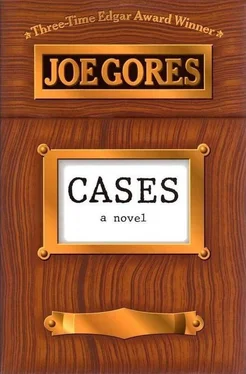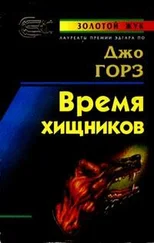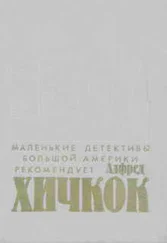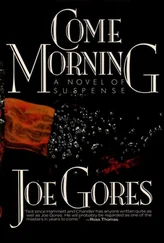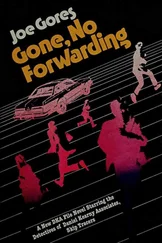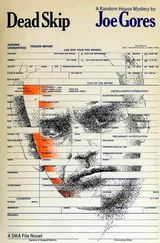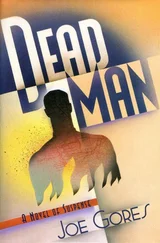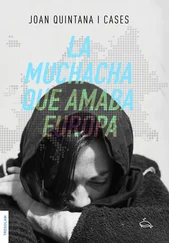“The reverend just keeps saying they were farmworkers from the Valley, he has no idea they were illegals. But—”
Penny said forcefully, “I think he was telling the truth.” She turned to Dunc. “Honey, what’s going on?”
“I told Gus’s uncle about getting beat up. He must have passed it on to his friends in the archbishop’s office, and they may have gone to the police. But this I don’t understand, the aliens getting busted here...”
The detective said, “Anyway, we really wanta talk with his acolyte or deacon or whatever the hell he calls himself?”
“Hector?” asked Dunc.
“Yeah.” The three of them walked over to the edge of the pool. The detective added, “The reverend seemed pissed at you.”
“Maybe he thought I was the one who called you.”
“Maybe. Anyway, this guy Hector’s got a lot of explaining to do. I really want to talk to him.”
There was a roar like an enraged bull elephant. They whirled — the six-by-six was roaring down the road at them, Hector hunched over the steering wheel, shrieking, face distorted.
“I’ll kill you! I’ll kill you!”
The detective dodged one way, Dunc dragged Penny the other, the massive truck’s nose and front wheels missed them all and hit the surface with a great splash, sending an inverted waterfall of filthy water out over the concrete skirting at the far end of the pool. Its rear wheels rested on the broken concrete apron, its engine drowning to silence.
“Here’s Hector now,” said Dunc to the detective.
It made the Metro section of the Monday L.A. Times, with a picture of Hector’s truck nose-down in the swimming pool at the church of a zany cult calling itself the Seven Priests of Melchizedek. Smart police work by the LAPD, said the paper, had broken up an illegal-alien smuggling ring involving the cult, three officials of a hod carriers’ union, and four immigration agents, who had been suspended pending an internal investigation. Six mentions of policemen, one of the archdiocese, none of Dunc.
They read it lying side by side on their stomachs on a big gaudy towel at Malibu beach, Dunc in dark blue boxer-style swim trunks, Penny looking like a movie star in her dark glasses and a shiny light blue one-piece swimsuit.
“So it was the union men all the time,” she said.
Dunc nodded. “They collected the first week’s dues and the fifty-buck initiation fee from each batch of Mexicans Hector and Rephaim brought up across the border at a hundred bucks each. They were making a mint.”
“I still don’t think Rephaim was involved.”
They rolled over onto their backs. “Okay, every two weeks Hector would deliver another crew. Immigration would show up every two weeks, steady as clockwork. They’d get a rake-off and great efficiency reports.”
“What about Donovan?” she persisted. “Was he involved?”
“Maybe he knew in a general way, but I don’t think so — he got too big a kick out of me hiding them away in the cornfield.”
He wanted to spend every minute with Penny until she went back east, but she needed her temp job for next term’s tuition. Dunc wanted to give her what he’d saved from his summer’s labors, just to have the time with her, but she wouldn’t take it.
After he picked her up from work, they’d go to a movie, or to eat dinner, or both; before he took her home they’d find a place to park and make love. No motels: Penny staying out all night would stretch her Aunt Goodie’s romantic nature too far.
One night when Penny had to work late, Dunc went to the Purple Cockatoo. But Pepe’s picture had been replaced by that of an impossibly blond woman calling herself Skylark Nightingale.
“When did Pepe leave?” Dunc asked the square-headed Germanic bartender. He had meaty hands and thick wrists but a surprisingly delicate touch mixing drinks.
The blue eyes looked blank. “Who?”
“Oh — uh... Pepper Paglia. The piano player.”
“Never heard of him.”
“He was playing here just last weekend,” said Dunc, fuming.
“I was off.” He turned away toward another customer.
Dunc nursed his beer. Would Pepe show up at the picnic on Monday? Or had he moved on again, abruptly, as he’d left Vegas? He always expressed himself better with music than with words; maybe he didn’t want to talk about that bloody night. Trying to hold him was like trying to hold quicksilver in your hand.
They were standing with a score of others in a line stretched out across the field, a wall of people on either side. Dunc wore Frisko jeans and a sport shirt; Penny, shorts and a sleeveless blouse. She had her hair pulled back behind her ears.
“May the best man win,” said Dunc with a manly grin.
Penny gave her marvelous laugh. “Or woman.”
A whistle blew. They began hopping frantically down the field in their potato sacks. Dunc tripped over his own feet and sprawled in the dirt. Penny won. Goodie and Carl were with Dunc; Carl sadly laid a dollar on his wife’s hot little hand, said to Dunc with a sneer, “Some great athlete!”
“I didn’t play football in a potato sack.”
Penny was aghast. “You bet against your own niece?”
A brass band was playing John Philip Sousa, the blare of horns carrying even over the cries and laughter of children. Cooking meat wafted its smell over from the picnic tables. At Griffith Park the great American Legion Labor Day picnic was in full swing. Pepe hadn’t showed.
“The turkey shoot starts in a few minutes,” said Carl. “I will single-handedly bring dignity back to the males.”
“Every year he enters the turkey shoot, every year we have to buy our Thanksgiving turkey,” Aunt Goodie said sadly. To Penny she added, “Let’s go reserve a picnic table.”
Penny said solemnly to Dunc, “Shoot one for the Gipper.”
Not that it was a literal turkey shoot. The contestants shot at suits of playing cards printed on paper. The one who got the best poker hand with five shots won a frozen turkey.
A large red-faced man was telling a joke about a sailor up from San Diego to pick up girls in L.A. A bartender had told him to go way out Sepulveda, find a shopping center, and carry the groceries of a pretty woman wearing a wedding ring to her car.
“ ‘Married broads are horny, she’ll take you home to bed.’ ”
“ ‘What if were in bed and her husband comes home?’ asks the sailor. The bartender says, ‘You run into the shower, and she tells her husband you’re her cousin in the navy up from San Diego. Then you get dressed and leave.’ ”
The big man was at least forty, at least an inch over six feet, with a round rubicund face and silvery receding hair swept straight back from his forehead. His nose was small, almost pug; his surface impression of beaming good nature was somewhat belied by small, quick blue eyes, watchful in repose.
“So they’re going at it when the husband drives up. The sailor runs into the shower and the wife tells her husband her cousin is up from San Diego. The husband takes one look at him and says, ‘You son of a bitch, I said way out Sepulveda!’ ”
They shot with .22 rifles with open sights; almost everyone was older than Dunc and nearly all of them had been in the service during the war. Uncle Carl was indeed a deplorable shot: only one of his five bullets even hit a card. The big jokester tried for a full house and got two pair, the best shooting yet.
“I can taste that bird now,” he grinned.
Dunc tried for a full house, too, and got it. Aces over eights. The big man came over to congratulate him.
“The dead man’s hand,” he said. “That’s fancy shooting.”
“Thanks,” said Dunc. Carl handed them both icy cold bottles of beer. The ladies appeared. Dunc said to Goodie, “You don’t have to buy your Thanksgiving turkey, after all.”
Читать дальше
